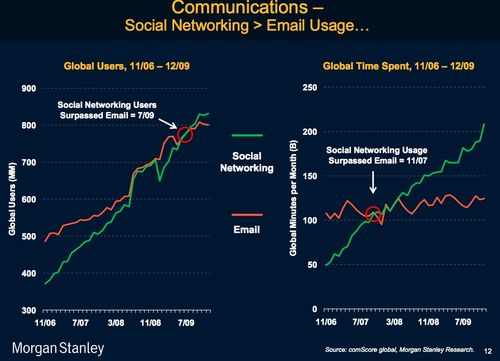I was emailing with a friend of mine yesterday who is a 30 year veteran of silicon valley. He'd written a post that was quite positive about the iPad. I sent him my post which wasn't so positive. We had a good discussion. Which ended with my friend making this point:
iPad’s
fate depends on entrepreneurs inventing new kinds of killer apps. (remember how
desktop publishing saved Mac?)
I got out of college in the early 80s when the desktop revolution was upon us. A bunch of my friends from MIT were piling into startups in Cambridge building products on top of this new desktop computing platform. One of them was a company called General Computer that made external hard drives for the original Macintosh, which you might recall came with only a floppy drive. General Computer did fantastic for a while but its business eventually faded away as Apple filled in the holes in the Macintosh product.
Contrast that with Lotus, another Cambridge company that built something entirely new on top of the desktop platform. Or Aldus, who started the desktop publishing business that "saved Mac" as my friend points out.
Which brings me to the title of this post. I've been thinking a lot about the Twitter Platform and Ecosystem recently. I think it is at an inflection point, much like the desktop software and hardware business was in the mid 80s as the desktop platform started to mature.
Much of the early work on the Twitter Platform has been filling holes in the Twitter product. It is the kind of work General Computer was doing in Cambridge in the early 80s. Some of the most popular third party services on Twitter are like that. Mobile clients come to mind. Photo sharing services come to mind. URL shorteners come to mind. Search comes to mind. Twitter really should have had all of that when it launched or it should have built those services right into the Twitter experience.
When you talk to a new user, they want to know how to post a photo to Twitter, they want to know "what is this bit.ly thing?", they want to know how to get Twitter on their iPhone. Names like Summize, Twitpic, Tweetie make no sense to them. Of course, without Summize, Twitpic, and Tweetie we would not have the Twitter we have today. They and many other third party products and services filled out the holes in the Twitter product and made it work better.
But those services don't feel like Lotus or Aldus to me. What are the products and services that create something entirely new on top of Twitter? I'll come back to that question, but one more history lesson, this one recent history.
When Facebook platform launched, we saw a massive number of new products and services launched on The Facebook. But many were slight variations on existing Facebook features (like Superwall) or holes in the Facebook service. As Facebook closed up those holes and enhanced their own feature set, those apps fell to the wayside. But there was one entirely new business that got created on top of the Facebook platform and that is social gaming, which industry analysts project will be a $1.6bn market this year and I think that number is low.
Facebook (and Twitter) have also spawned the social media agency business, helping businesses and brands market themselves in social nets, which may be even bigger than social gaming when you add up all the companies in it. That business opportunity is directly analogous to the search agency business that got built on the back of Google as it scaled into the business it is today.
So it is clear that you can build large businesses on top of a social platform like Facebook and Twitter. And because Twitter is so open and so lightweight, I am surprised that there aren't more "new kinds of killer apps" to quote my friend who I started this post with.
Here's are some places where I think we might see these killer apps emerge:
* Social Gaming – There have been a number of attempts to build social game experiences on Twitter. But I'm not aware of any successes of scale like we've had on the Facebook platform. I think we will see it emerge soon.
* Verticals – We have some successes to point to here like Stocktwits for finance and Flixup for movies but this is a wide open opportunity in most verticals and we haven't seen as much effort here as I'd have expected.
* Enterprise – CoTweet comes to mind as well as the efforts that Salesforce has made to integrate Twitter. This is a huge opportunity.
* Discovery – This is one area where there is a significant amount of effort. Hunch, Listorious, TweetMeme, Cadmus, WeFollow, and MrTweet all come to mind.
* Analytics – While Twitter will obviously be delivering better analytics to its users, particularly its marketing and business users, I believe that there is always a market for third party analytics. Google Analytics is available for free and yet none of the large analytics providers have seen their businesses suffer. There is simply a voracious appetite for information on the Internet. So companies like bit.ly, Radian6, HubSpot, Scout Labs, and others have a bright future.
But these are the obvious places to look for killer apps on Twitter Platform. If I can see them, so can many others. I think there are a number of non-obvious places, like desktop publishing was on the Mac, where something entirely new will be built on top of Twitter. And that's what I'd like to challenge entrepreneurs and developers out there to focus on. I think the time for filling the holes in the Twitter service has come and gone. It was a great period for Twitter and its third party developers.
I believe we are entering a new phase now. Twitter is a global platform, the 33rd largest in the world according to Comscore, with almost 70mm uvs worldwide in February. It is a large company now with the resources to service the ecosystem in ways it never could before. It's hosting its first developers conference, Chirp, in San Francisco next week. And so it's time for Twitter and its developer ecosystem to work together to create entirely new things that will shape the Internet in the coming years. I'm excited to see it happen.





